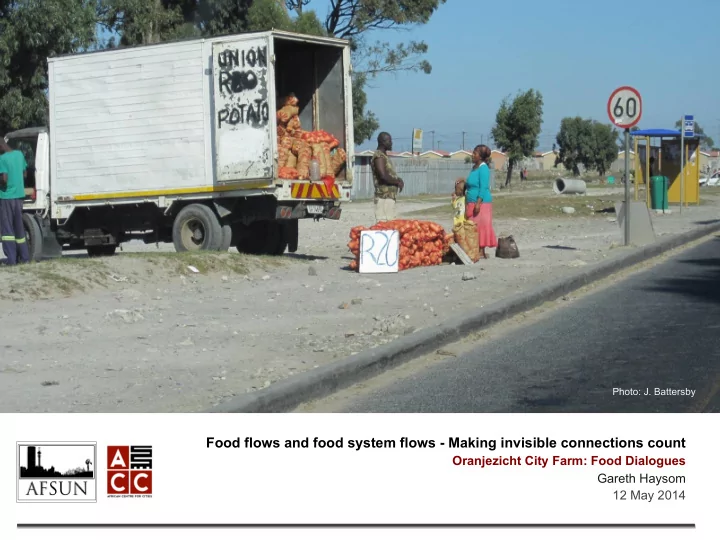

Picture : Peter Mackenzie Photo: J. Battersby Food flows and food system flows - Making invisible connections count Oranjezicht City Farm: Food Dialogues Gareth Haysom 12 May 2014
Urban Transition Nutrition Transition Food System Transition Economic & Ecological Transitions
South Africa’s dietary mix StatsSA, 2012
! City of Cape Town’s Ecological Footprint Crop Pasture Sea Forest Built Energy Total EF Biocapacity EF South Africa 2006 (2003 data) 0.38 0.23 0.05 0.17 0.05 1.35 2.30 2.0 (pop: 45 Million) 0.73 0.44 0.10 0.32 0.10 1.35 3.04 EF Cape Town 2006 24% 14% 3% 11% 3% 44% Source:(Gasson,(2002(&(Hansen,(2009( Big contributors - Energy 44% - Food 41% (fresh produce about 11% of total food EF) ! • 2.3 planets • 112 349 square kilometres (CoCT = 2 461 km 2 = x45) • Per capita footprint is 4.28 hectares (Swilling, 2006; CoCT, 2009)
Stellenbosch Food Flows Export:%Int% Export:%Local% Tea/% Deciduous% Livestock% Wine%grapes% Vegetables% nuts% fruit% products% Cape%Town%Fresh% Produce%Market% Stellenbosch%Municipal%Area% Packsheds% Vendors% Other% Central%Distribu9on% Major%Franchise%Retailers% Spar% Centres% Consumers% Schulschenk, 2010
Material Flows in the US Food System (1995 – in million pounds)
Mat & Family R1200/Week Photos: L Meterlerkamp; Concept: P Menzel, (Hungry Planet)
Photos: L Meterlerkamp; Concept: P Menzel, (Hungry Planet) Audrey & David R565/Week
Natasha R510/Week Photos: L Meterlerkamp; Concept: P Menzel, (Hungry Planet)
Brendon & Anneke R310/Week Photos: L Meterlerkamp; Concept: P Menzel, (Hungry Planet)
Pieter & Thelma R 189/Week Photos: L Meterlerkamp; Concept: P Menzel, (Hungry Planet)
Photos: L Meterlerkamp; Concept: P Menzel, (Hungry Planet) Nora R120/Week
Mat & Family R1200/Week Audrey & David R565/Week Natasha R510/Week Brendon & Anneke R310/Week Pieter & Thelma R 189/Week Nora R120/Week
Food Regime Thesis – Friedmann and McMichael, (1989) 1600s 1850 1970 2008 1 st Food Regime (Organising principle: Empire) 2 nd Food Regime (Organising principle: The State) 3 rd Food Regime (Organising principle: The Market) 4 th Food Regime (Organising principle: Society, Environment, Biofuels) ?
“In Eastern Europe and the countries that used to belong to the Soviet Union, even after the collapse of their planning systems there has been persistent and widespread puzzlement that any society could aspire to prosperity without an overall plan. About two years after the breakup of the Soviet Union I was in discussion with a senior Russian official whose job it was to direct the production of bread in St. Petersburg. "Please understand that we are keen to move towards a market system", he told me. " But we need to understand the fundamental details of how such a system works. Tell me, for example: who is in charge of the supply of bread to the population of London ?" There was nothing naive about his question, because the answer ("nobody is in charge"), when one thinks carefully about it, is astonishingly hard to believe. Only in the industrialised West have we forgotten just how strange it is.” (Seabright 2010, 10)
A re-emerging food focus ...
Slow Violence? • We see what is immediate and dramatic.... Media-driven “events” capture popular opinion, and obscure the deeper and more systemic challenges – the volcanic eruption ... • The unseen urban challenge of malnutrition, vulnerability and food insecurity - particularly invisible in our cities - is one such challenge. The Slow Violence? From Nixon, 2007 • What is the role of the city and food system agents in urban food governance? All pictures AFSUN !
Concept adapted from Rocha, 2008
Community Food Security Coalition US n=176
Scale oriented food governance typologies US/CAN Excluding US state and regional scales (US n= 105/CAN n= 61)
Growth in Canadian urban food governance structures 2 1 1 1990 1991 1992 1993 1994 1995 1996 Toronto Food None None None None Thunder Bay, ON Gatineau, QC Policy Council Kamloops, BC 2 1 1 1 2 2001 2000 1999 1998 1997 None Ottawa, ON Burnaby, BC Chathum-Kent, ON 13 municipalities 2002 Comox Valley & 3 electoral Richmond, BC Region, BC areas, BC Saskatoon, SK 1 7 5 1 8 1 2003 Sudbury, ON 2004 2005 2006 2007 Vancouver, BC 2008 Cranbrook, BC Williams Lake, ON Hamilton, ON Abbotsford, BC Vancouver Kootenay, BC Lillooet, BC North Shore, BC Kawartha London, ON Nelson, BC Lakes, ON Calgary, AB Salmon Arm, BC Powell River, BC Haliburton, ON Kaslo, BC Armstrong, BC Mission, BC New Westminster, BC Prince Albert, SK Waterloo, ON St. John’s, NL 7 7 8 2 2012 2011 2010 2009 Oxford, ON Markham, ON Huntsville, ON Peterborough, ON Westmorland Albert Edmonton, AB Kingston, ON Regions of Durham, County, NB Niagara, ON Chilliwack, BC Halton, Niagara, Peel, York Region, ON Region of Durham, ON York, and the Cities of Simcoe County, ON Winnipeg, MB Hamilton and Toronto Chathum-Kent, ON Creston Valley, BC Bowen Island, BC Montreal, QC North Thompson Guelph, ON Shuswap, BC Valley, BC Haliburton, ON Delta, BC Northumberland, NB MacRae and Donahue, 2013 !
Other flows ... How reliable is the information? What impact does it have on food security? What is the role of the media in all this? What about big food companies? Do governments have a role to play?
Battersby and Peyton, 2013
Battersby and Peyton, 2013
Battersby and Peyton, 2013
Battersby, Marshak and Peyton, 2013
“The notion of ‘epistemic community’ is derived from the idea that knowledge-generating collectives can be convened to exchange vigorously perspectives within a broader shared commitment to find practicable ‘solutions’ to intractable social and economic problems” and that “one can argue that the purpose of the epistemic community is to challenge fundamentally the conventional orthodoxy about what is possible and impossible in terms of transformative urban development agendas”. Pieterse (2006: 289)
Thank you Gareth Haysom Email: gareth.haysom@uct.ac.za www.afsun.org Thanks to Jane Battersby, Luke Metelerkamp & Maya Marshak
Recommend
More recommend